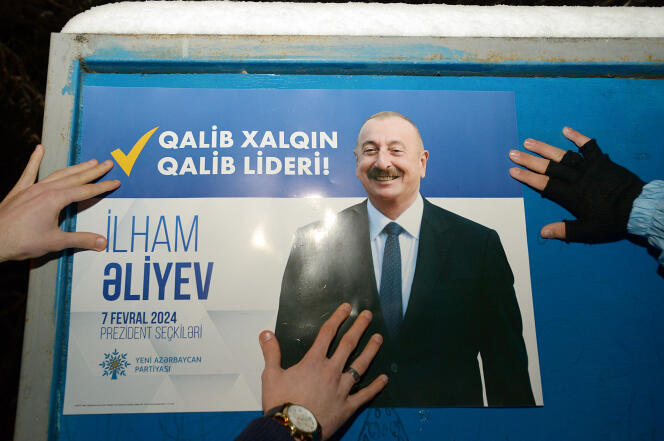


On February 7, Azerbaijan's 62-year-old president, Ilham Aliyev, will bestow upon himself a fifth term in office – against a backdrop of fierce repression of independent media and the threat of slamming the door on European institutions. Some 6.3 million voters are being called to the polls to choose between the man who inherited the presidency from his father, Heydar Aliyev, in 2003, and six other candidates vying with each other in ways that they may ensure that no one votes for them.
"Voters have turned away from politics to an unprecedented degree," explained exiled political scientist Bahruz Samadov. "This can be explained by the genuine popularity of the outgoing president, Ilham Aliyev, who boasts of having restored Azerbaijan's sovereignty in Nagorno-Karabakh, but also by the intensification of repression during the election campaign."
At the end of September 2023, a military operation launched from the capital of Baku led to the flight of more than 100,000 people (almost all the Armenians living in the region) from Nagorno-Karabakh. For three decades, the enclave had been administered by a separatist entity allied with Armenia and outside Baku's control. By 2020, Azerbaijan had forcibly retaken a large part of it, inflicting a crushing and deadly defeat on the Armenians.
Keen to convert this military victory into an election win, Aliyev has brought forward the election by a year, while cracking down further on critical voices. Since November 2023, 10 journalists have been arrested by the authorities.
During the last presidential election in 2018, the opposition succeeded in staging several large demonstrations in Baku. By mid-December 2023, the two main opposition parties, Müsavat and the Popular Front of Azerbaijan, had decided to boycott the ballot. "We will not take part in this circus, this fake election is nothing but a sham of democracy," declared the leader of the Popular Front, Ali Karimli, during his party's convention. According to the American organization Freedom House, Azerbaijan ranks among the 16 countries with the fewest civil liberties and political rights in the world, alongside Myanmar and Yemen.
The deterioration of the political system has not escaped the attention of the Organization for Security and Co-operation in Europe (OSCE), which has sent 11 observers to the presidential campaign. In an interim report published on its website, the OSCE drew attention to the absence of genuine competition, government pressure on the media and obstacles to election monitoring by public bodies. It also noted: "Of the six presidential candidates standing in this election other than the incumbent, all have been publicly supportive of the President in the recent past."
You have 50% of this article left to read. The rest is for subscribers only.
